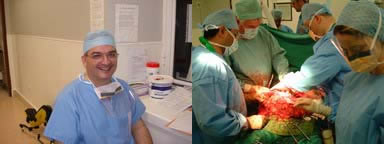 |
 |
|
|
All images, illustrations & flash animation are copyrighted to Deya Marzouk, unless stated otherwise. Copy is prohibited without written permission. Innovative techniques mentioned in this web site were all devised by Deya Marzouk. Please Credit Deya Marzouk if any material is copied from here (with prior permission only) |
This not uncommon condition is frequently confused with haemorrhoids. The difference is simple and in addition both conditions may co-exist. Haemorrhoids essentially represent prolapse (sliding down) of the anal mucosa, while mucosal prolapse represent sliding down of the rectal mucosa
Most patients complain of bleeding per rectum and or mucus discharge. Many have pruritis ani (itching around the anus) as a result of passive leakage of mucus or faeces. some patients have pronounced obstructed defaecation symptoms such as feeling of incomplete emptying and having to strain to empty. In some patients leakage amounts to frank faecal incontinence
Diagnosis is straightforward on inspection of the anal region or on proctoscopy. In some cases this is also noted during evacuation proctography done for obstructive defaecation symptoms
In mildly symptomatic cases, patients will respond well to conservative measures. Most other patients will benefit from surgical treatment
A. Conservative measures: Increase in dietary fiber is advised. Straining during defaecation is strongly discouraged and the patient needs to understand the vicious cycle of straining - prolapse - straining (see above). Obviously some straining may be unavoidable, but patients must be persuaded that prolonged and chronic straining must stop. Patients need to know that the sensation of something remaining in the rectum after defaecation may be false (resulting from the mucosal prolapse presence in the upper anal canal) and that this sensation should be ignored following a bowel motion. Use of glycerine suppositories to aid defaecation may be helpful. These conservative measures are also essential following surgical treatment.
B. Surgery: Most patients will benefit from surgical intervention. I think banding and injection sclerotherapy are ineffective and I only treat patients with resection. The majority needs standard transanal resection of mucosal prolapse (see slide show). Few patients with circumferential mucosal prolapse needs Delorme's operation instead
 |
 |
|